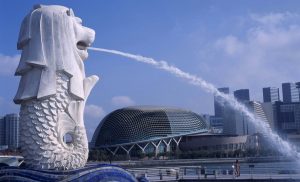
LAUSANNE, Switzerland, May 29, 2019 /PRNewswire/ — Singapore has been ranked as the world’s most competitive economy for the first time since 2010, according to the IMD World Competitiveness Rankings, as the United States slipped from the top spot, while economic uncertainty took its toll on conditions in Europe.
Singapore’s rise to the top was driven by its advanced technological infrastructure, the availability of skilled labor, favorable immigration laws, and efficient ways to set up new businesses. Hong Kong SAR held on to second place, helped by a benign tax and business policy environment and access to business finance.
The initial boost to confidence from President Donald Trump’s first wave of tax policies appears to have faded in the United States, according to the ranking. While still setting the pace globally for levels of infrastructure and economic performance, the competitiveness of the world’s biggest economy was hit by higher fuel prices, weaker hi-tech exports and fluctuations in the value of the dollar.
“In a year of high uncertainty in global markets due to rapid changes in the international political landscape as well as trade relations, the quality of institutions seem to be the unifying element for increasing prosperity. A strong institutional framework provides the stability for business to invest and innovate, ensuring a higher quality of life for citizens,” said Arturo Bris, IMD Professor and Director of IMD World Competitiveness Center, the research center which compiles the ranking.
Economists regard competitiveness as vital for the long-term health of a country’s economy as it empowers businesses to achieve sustainable growth, generate jobs and, ultimately, enhance the welfare of citizens.
The World Competitiveness Rankings, established in 1989 at IMD business school, incorporate 235 indicators from each of the 63 ranked economies. The ranking takes into account a wide range of “hard” statistics such as unemployment, GDP and government spending on health and education, as well as “soft” data from an Executive Opinion Survey covering topics such as social cohesion, globalization and corruption.
Switzerland climbed to fourth place from fifth, helped by economic growth, the stability of the Swiss franc and high-quality infrastructure.
This year’s biggest climber was Saudi Arabia, which jumped 13 places to 26th.
The top 10 countries and regions are Singapore, Hong Kong SAR, USA, Switzerland, UAE (up from 15thin 2016), Netherlands, Ireland, Denmark, Sweden, and Qatar.
Venezuela remains anchored to the bottom of the ranking, hit by inflation, poor access to credit and a weak economy.




